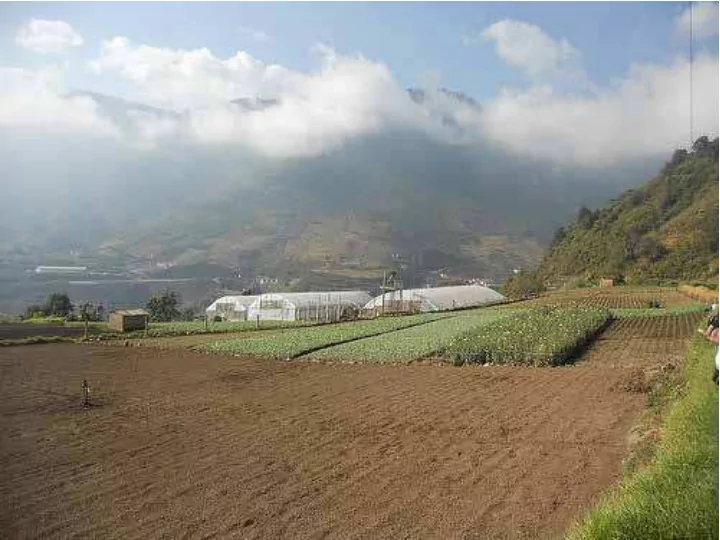

Michael Reid Leader, Innovation & Special Projects HORTICULTURE Meeting Title/Date 1
• Funded by USAID • Spearheaded by UCD, MSU, UH, Purdue, AVRDC • Global consultation • Synthesis of major constraints • Evaluation of research approaches • Recommendations on next steps 2
} Access to markets } Postharvest losses } Food safety } Germplasm } Sustainable production } Information and education } Government policy 3
} “A Collaborative Research Support Program in Horticulture is proposed. This CRSP would be designed to provide research, capacity building, and knowledge extension support essential for the development of the global horticulture sector” 4
} Work closely with AVRDC and its CGIAR partners in the newly developed Global Horticulture Initiative } Center for knowledge generation, capacity building, and integration } Partner with individual, regional, and global consortia of Missions and private and public partners to design and implement projects addressing the core challenges 5
} Development of phytosanitary and postharvest protocols for the small producer } Development of small- scale agrochemical and seed supply micro- enterprises } Establishment of a Global Horticulture Knowledge Bank and Extension System 6
} One of 10 USAID funded CRSPs } UCDavis (lead), NCSU, Cornell, and UH } 5 year initial award } Focused on the entire value chain } Themes ◦ Information Accessibility ◦ Innovation ◦ Gender Equity 7
} To apply research findings and technical knowledge to increase smallholders’ participation in markets } To build local scientific and technical capacity } To facilitate the development of policies that improve local horticultural trade 8
} $75,000 to $1 mil } Africa: Benin, Democratic Republic of the Congo, Gabon, Ghana, Kenya, Malawi, Nigeria, Rwanda, South Africa, Tanzania, Uganda, Zambia, and Zimbabwe } Latin America: Bolivia, Chile, Costa Rica, Dominican Republic, Ecuador, El Salvador, Guatemala, Haiti, Honduras, Mexico, Nicaragua, Panama, and Peru } South and Southeast Asia: Bangladesh, Cambodia, India, Laos, Nepal, Sri Lanka, Thailand, and Vietnam 9
} Improving Seed Systems } Tackling Issues in Production and Marketing } Testing and Transferring Innovative Technologies } Reducing Postharvest Losses } Keeping the Food Supply Safe } Improving Household Nutrition } Delivering Information and Building Capacity 10
} 4,935 rural households reached. } Over 100 new technologies under research. } Over 10,000 hectares under improved management. } Over 108 students engaged in projects. } 18,297 people trained (51% women). ◦ Marketing strategies, seed systems, developing businesses, postharvest technologies, food safety, rapid pathogen diagnostics, processing… 11
} Demand driven. Aimed at intermediary practitioners working in developing countries } Credible. Adds value to and builds on existing local and global information } Focused. Practical “how to” information } http:/ / hortkb.weebly.com 12
} Establish in recognized regional institutions } Will become regional foci for Horticulture CRSP activities ◦ Training ◦ Research ◦ Outreach ◦ Information 13
14
} Work closely with AVRDC and its CGIAR ✔ partners in the newly developed Global Horticulture Initiative } Center for knowledge generation, capacity ✔ building, and integration } Partner with individual, regional, and global ✔ consortia of Missions and private and public partners to design and implement projects addressing the core challenges 15
} Example projects ◦ Development of phytosanitary and ✔ postharvest protocols for the small producer ? ◦ Development of small- scale agrochemical and seed supply micro- enterprises ◦ Establishment of a Global Horticulture ✔ Knowledge Bank and Extension System 16
17
} Access to markets ✔ ✔ } Postharvest losses } Food safety ✔ } Germplasm ✔ ✔ } Sustainable production } Information and education ✔ } Government policy x 18
} Global Assessment } LAC assessment ◦ Access to markets ◦ Market access ◦ Postharvest losses ◦ Postharvest losses ◦ Information and education ◦ Inadequate extension ◦ Sustainable production ◦ Pests, diseases, and weeds ◦ Germplasm ◦ Access to inputs ◦ Food safety ◦ Access to credit & insurance ◦ Government policy ◦ Climate change 19
} Where should we focus in the future? 20
} Unattended areas? } Our core themes? ◦ Access to credit and ◦ Information, innovation, insurance gender ◦ Climate change } Applied to our core ◦ Government policy programs? ◦ Access to markets } Scaling ◦ Postharvest losses ◦ Existing technologies? ◦ Information and ◦ New technologies? education } Everything? ◦ Sustainable production ◦ Germplasm 21
22
Recommend
More recommend